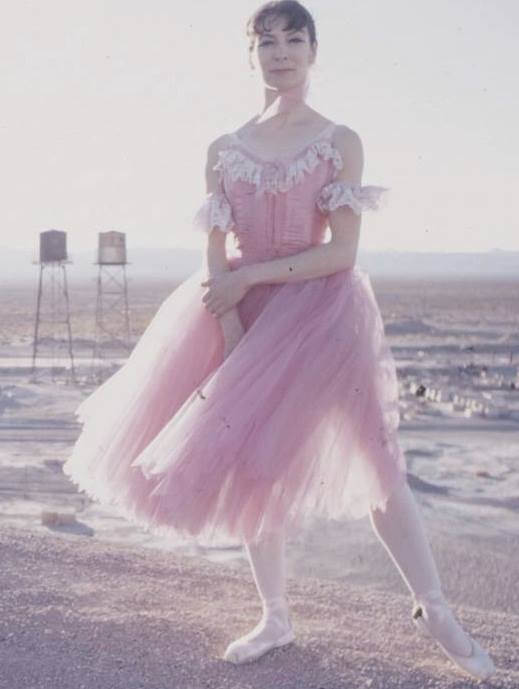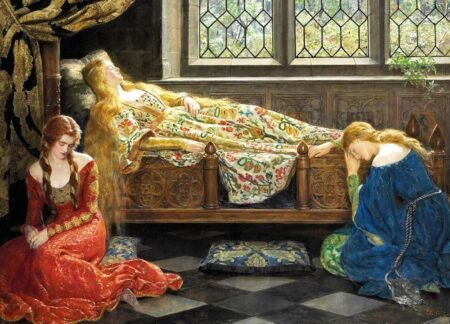OLIVIA WACHOWIAK reviews Nicolette Polek’s forthcoming novel, Bitter Water Opera.
“Am I eccentric? Is it eccentric to love your work so much that you would go anywhere in the world to do it?” pondered Marta Becket in a 1999 interview. About three decades prior, the dancer had left Broadway for Death Valley Junction, or Amargosa, a desolate town nestled in the Mojave Desert (population 10). There, she transformed an abandoned theatre into her own opera house and performed to a near-empty auditorium, as was to be expected in the heart of the desert. It didn’t bother her though, not because the lack of actual spectators was concealed by the mural she painted of her perfect audience on the walls of the performance hall, but rather, because Marta’s love for art stemmed from her all-consuming appreciation of the making process: “I’d dance on one leg if the other didn’t work”. She had no concern for “where the lights [were]”, embracing art as immediate, a mystic element of the quotidian. The lonesome desert was therefore the perfect setting for her work, her relocation motivated by her complete embracement of simplicity—arguably, the opposite of eccentric.
The story of Marta Becket is so absurdly romantic it could well be a myth, or a fairy tale. As it makes its way into Nicolette Polek’s debut novel, Bitter Water Opera, an unfamiliar reader is likely to deem it the author’s creation: up until the acknowledgements page, I thought that the figure of Marta was fictional, perhaps a variation on Martha Graham. I was surprised to find that her story is real, not only because of how hard-to-believe it is, but how seamlessly it fits Polek’s plotline, gradually unfolding as a model for overcoming limerence, and culminating as a challenge to the reader’s faith.
The protagonist, Gia, finds her life in shambles, having recently ended a relationship and taken a leave from her job as professor of film studies. She struggles to attend to her reality: get out of bed, organise her house, call her mother, and instead, seeks refuge in longing for the elusive: a better family, an ideal partner, an ease into artmaking, God, and…Marta. After stumbling across her photo in a library archive, Gia sends her a letter, which leads to the deceased dancer’s mysterious appearance in her home. Marta becomes her mentor on the journey away from the idealisation of mysticism, concluding, somewhat ironically, in the faraway Amargosa Opera House. At her destination, Gia challenges notions of faith, accepting God as ambiguous, reachable only through “an amplification of the heart”, “a magnifying and stirring and knocking, often against the heart-bearer’s will”. Such a realisation proves to be the only path to the materialisation of the sacred amongst the nothingness of the mundane. Just like Marta, Gia was destined for the desert, even if only temporarily, for the setting proved metaphorically ideal to break through her predicament, as becomes clear when the disorienting, broken vignettes give way to a sharp focus.
The novel is fraught with both the mundane and the transcendent, which we inevitably find ourselves entangled between. Though the resolution of Gia’s central predicament may not exactly offer her liberation, liminality ultimately gives way to balance, “joy completed and doubly felt.” Yet we eventually recognise that such an equilibrium is inherent, and limerence dependent wholly on the internal. After all, the immediate reality surrounding Gia throughout the novel is nothing short of esoteric: exotic fruit, delectable meals, bright colours…And what she first views as sacred proves to be not far from the ordinary. Amongst tropical plants, it is a simple pear tree she chooses to tend in her garden. The colour lime-green is seen not only in the extravagant attire worn by Marta’s ghost, but also in the boots of a gardener, or an ordinary grasshopper. Even a supposed dead human corpse proves to be something far less dramatic than it appears…

Marta’s visits in Gia’s reality mark this intersection between extremes, although at first to the protagonist’s oblivion. At the start of their friendship, as they watch The Red Shoes (1948) together, Marta, much to Gia’s surprise, roots for Victoria’s pursuit of reality, her personal life, rather than the sacred, her career in dance. It becomes clear that the signs were really there all along, the novel embodying more so the process of building consciousness, and the gaining of faith in the belief that, indeed, as we are foretold in the epigraph, “Blessed are the poor in spirit”.
Bitter Water Opera is set to be released through Graywolf Press on April 16th, 2024. Featured image: Marta Becket. Source: amargosaoperahouse.org.





